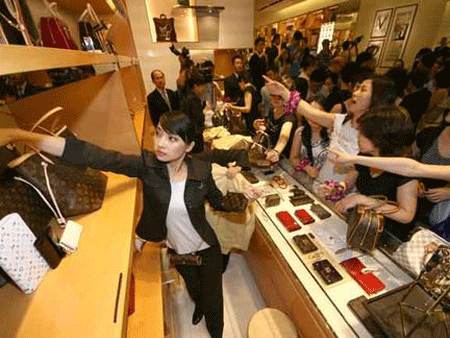Top Brand Goods Still In Hot Demand When It Comes To Counterfeit Goods


Even though many people are struggling financially these days, there is still a desire to be seen in the right clothes and give off the best possible image. If you cannot afford to wear these big name brands and designer labels, there are a number of options available to you.
Most people will come to terms with the fact that they cannot afford these clothes and will “cut their cloth accordingly”, which means that they will likely buy similar products of a lesser brand at a much lower price. If you cannot afford something, you either have to save up or do without, but of course, given that there is such a high demand for these major label products, there will always be an opportunity for people to get involved with the market anyway that they can.
The main options for people looking to provide a service for people who cannot afford high quality goods in a conventional manner is to steal the authentic items and then sell for a lower than retail price which provides them with an income. The other option is to make or obtain counterfeit goods, which aren’t the real thing but from a distance or at least not under close inspection, will give the impression that people are wearing the real thing.
For many people, the allusion of wearing branded clothing is good enough for them which mean that they are more than happy to pay for “knock-off” goods and material as opposed to settling for substandard goods that don’t have a major label or brand on them.
The fact that there is this demand in the marketplace means that there will be people looking to fill this gap and a recent example has arisen in Barrow in the United Kingdom. Lynn James, a 43 year old woman from Barrow appeared in the Furness Magistrates Court where she was facing 17 charges of possessing counterfeit goods. It is believed that James was intending to sell these items. She also appeared in court for benefit fraud amounting to £17,358.90 so she was facing a number of serious allegations.
The brands that she was alleged to have been in possession of were all big names, and were exactly the sort of thing that would appeal to a wide audience. She was found with counterfeit Beats products including speakers and headphones, Superdry clothing, Ugg boots, Adidas clothing and trainers from Converse All Star and Nike.
These are amongst the leading brands in their respective industries and many people are happy to pay a premium price for these goods. Some people believe that the goods are of a better standard or quality, but there is also a lot to be said for the image and identity that comes with these leading brands. People buy into an association with brands and this is what much of the cost is when buying Nike or Adidas products over similar sporting products from a lesser name.
With the accused also facing allegations that she was claiming benefits between 2012 and 2014, there is a lot of information to be heard and the preliminary hearing has been set for the 15th of May at Preston Crown Court.
The area of counterfeit crime and fraud will have many people arguing about who the victims are. Clearly there are major firms being ripped off, but if people were unable to afford these products, it is not as if you can say that these firms are losing out on sales.
However, there are other damages that can apply to these firms, such as their image and identity taking a hit if people see these counterfeit goods, judge them to be of poor quality but make the association between the fake product and the larger brand. There are many different aspects involved with branding and company trademarks are protected for a reason. If there was no protection, there would be no incentive for these firms to make their products or at least make them to the standards that they currently do.
Some people may argue that this style of crime is a victimless crime but an experienced counterfeit goods solicitor understands that there are many aspects to the crime, and it can be a difficult process to work through.
Andrew Reilly is a freelance writer with a focus on news stories and consumer interest articles. He has been writing professionally for 9 years but has been writing for as long as he can care to remember. When Andrew isn’t sat behind a laptop or researching a story, he will be found watching a gig or a game of football.
